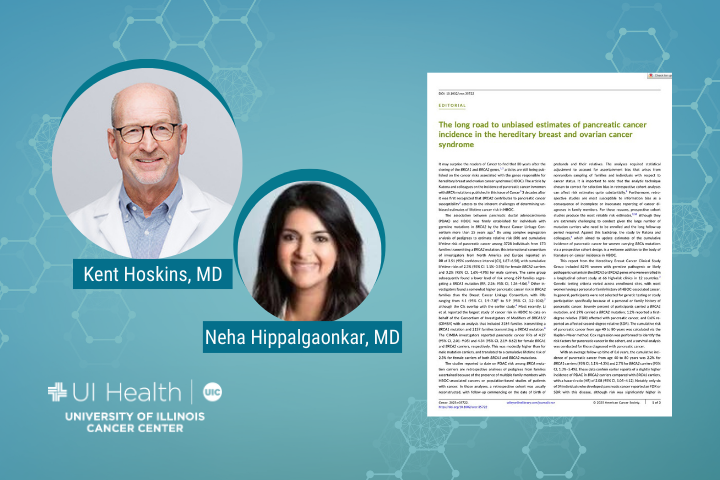
UI Health Oncology Service Line Medical Director and University of Illinois Cancer Center member Kent Hoskins, MD, is corresponding author of the invited editorial “The Long Road to Unbiased Estimates of Pancreatic Cancer Incidence in the Hereditary Breast and Ovarian Cancer Syndrome (HBOC),” published in Cancer, an international interdisciplinary journal of the American Cancer Society.
The article discusses the study, “The Incidence of Pancreatic Cancer in Women with a BRCA1 or BRCA2 Mutation,” by Byron W. Katona, MD, of the University of Pennsylvania Perelman School of Medicine in Philadelphia, and colleagues.
The editorial, which included authors Neha Hippalgaonkar MD, a Chief Fellow in the Division of Hematology and Oncology at the University of Illinois College of Medicine Chicago, and Dezheng Huo, PhD, Professor of Public Health Sciences and Medicine at the University of Chicago, is excerpted below.
“On the 30th anniversary of the isolation of the BRCA2 gene, Katona and colleagues from the Hereditary Breast Cancer Clinical Study Group are to be congratulated for their painstaking work over several decades with this large prospective cohort of individuals with HBOC. Their work is generating important data on cancer risks in HBOC that largely confirm findings from earlier retrospective pedigree studies and may influence clinical practice guidelines for cancer screening in BRCA mutation carriers. The road to unbiased pancreatic cancer risk estimates in HBOC has been long indeed, and more work remains. There is an urgent need for better predictors of pancreatic cancer risk in HBOC that would provide improved risk stratification and allow a tailored and more cost‐effective approach to reducing mortality from pancreatic cancer in families with this important hereditary cancer syndrome. Prediction tools that incorporate the risk factors identified in this study (family history, heavy use of alcohol, and diabetes) would be a step in the right direction; however, it is unlikely that clinical factors alone will provide sufficient discriminatory accuracy for a relatively rare condition. Development of prediction models with clinical utility in HBOC will likely require a combination of clinical and genomic markers of risk such as polygenic risk scores or multicancer early detection tests. We hope that this study will accelerate progress toward this goal.”
